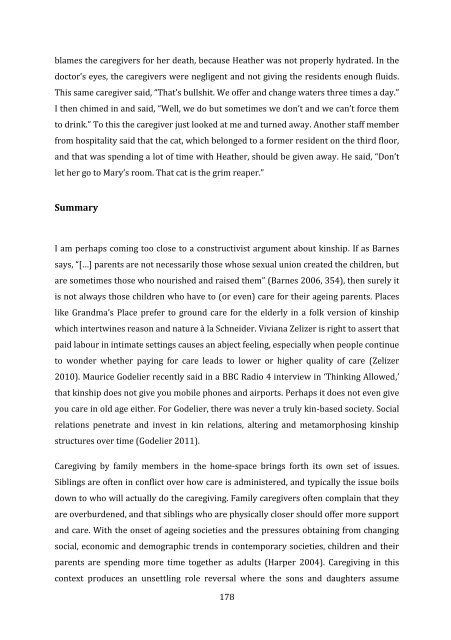Philip Y. Kao PhD thesis - Research@StAndrews:FullText
Philip Y. Kao PhD thesis - Research@StAndrews:FullText
Philip Y. Kao PhD thesis - Research@StAndrews:FullText
You also want an ePaper? Increase the reach of your titles
YUMPU automatically turns print PDFs into web optimized ePapers that Google loves.
lames the caregivers for her death, because Heather was not properly hydrated. In the<br />
doctor’s eyes, the caregivers were negligent and not giving the residents enough fluids.<br />
This same caregiver said, “That’s bullshit. We offer and change waters three times a day.”<br />
I then chimed in and said, “Well, we do but sometimes we don’t and we can’t force them<br />
to drink.” To this the caregiver just looked at me and turned away. Another staff member<br />
from hospitality said that the cat, which belonged to a former resident on the third floor,<br />
and that was spending a lot of time with Heather, should be given away. He said, “Don’t<br />
let her go to Mary’s room. That cat is the grim reaper.”<br />
Summary<br />
I am perhaps coming too close to a constructivist argument about kinship. If as Barnes<br />
says, “[…] parents are not necessarily those whose sexual union created the children, but<br />
are sometimes those who nourished and raised them” (Barnes 2006, 354), then surely it<br />
is not always those children who have to (or even) care for their ageing parents. Places<br />
like Grandma’s Place prefer to ground care for the elderly in a folk version of kinship<br />
which intertwines reason and nature à la Schneider. Viviana Zelizer is right to assert that<br />
paid labour in intimate settings causes an abject feeling, especially when people continue<br />
to wonder whether paying for care leads to lower or higher quality of care (Zelizer<br />
2010). Maurice Godelier recently said in a BBC Radio 4 interview in ‘Thinking Allowed,’<br />
that kinship does not give you mobile phones and airports. Perhaps it does not even give<br />
you care in old age either. For Godelier, there was never a truly kin-based society. Social<br />
relations penetrate and invest in kin relations, altering and metamorphosing kinship<br />
structures over time (Godelier 2011).<br />
Caregiving by family members in the home-space brings forth its own set of issues.<br />
Siblings are often in conflict over how care is administered, and typically the issue boils<br />
down to who will actually do the caregiving. Family caregivers often complain that they<br />
are overburdened, and that siblings who are physically closer should offer more support<br />
and care. With the onset of ageing societies and the pressures obtaining from changing<br />
social, economic and demographic trends in contemporary societies, children and their<br />
parents are spending more time together as adults (Harper 2004). Caregiving in this<br />
context produces an unsettling role reversal where the sons and daughters assume<br />
178
















